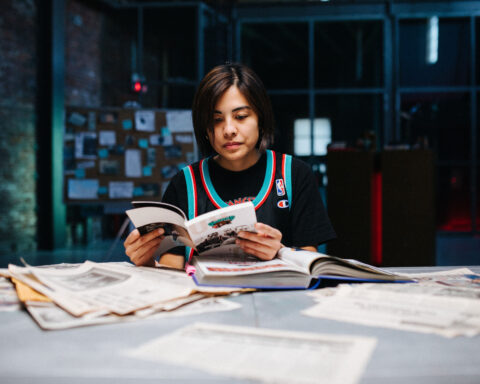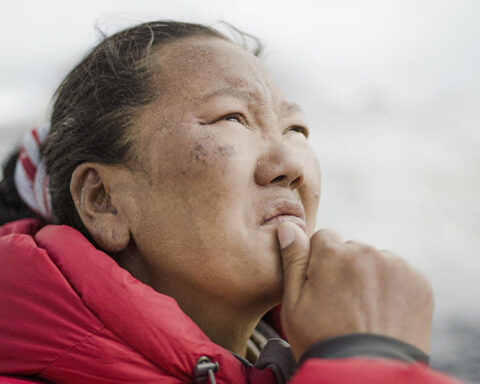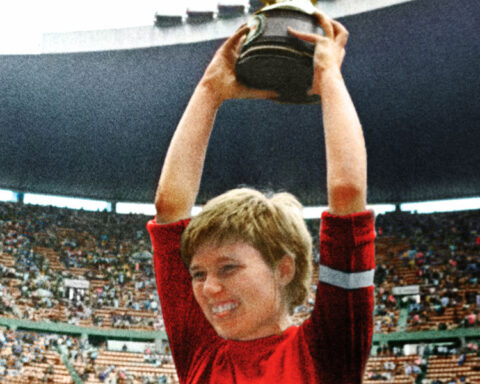Nice People
(Sweden, 90 min.)
Dir. Anders Helgeson, Karin af Klintberg
The spirit of the 1993 comedy Cool Runnings, which famously told the story of a successful Jamaican bobsled team, endures in the Swedish documentary Nice People. This new film from directors Anders Helgeson and Karin af Klintberg tells the rousing story of a group of Somalian immigrants picking up the sport of bandy (like hockey, but with a ball instead of a puck) in their adopted home of Sweden. The Somalian players are outsiders in the podunk town of Borlänge, where several of the native Swedes in the community fear that the local population is becoming “too black” for its own good. However, in the fashion of any jubilant sports film, Nice People portrays the power of building communities through shared experiences.
The film’s title offers an ironic reference to Borlänge’s official slogan, as the town’s self-definition as a land of “nice people” doesn’t match the image of the inhabitants that this documentary initially offers. As Nice People outlines the inspiration of Borlänge playboy Patrik Andersson to use sports to help integrate immigrants into the community, the directors interview a host of townspeople who frankly reveal outdated and politically incorrect perceptions about the Somalian immigrants of Sweden. They see them as bicycle thieves, deadbeats, and thugs, not as contributing members of society. Nice People gains immediate relevance as it hits theatres in the wake of the #OscarsSoWhite controversy and the necessary (and long overdue) conversation about inclusion and onscreen representation. The film shows that the Swedes lack positive images of their Somalian neighbours; therefore, they simply recycle ideas and perceptions to rationalize the value of a Sweden that’s as white as snow.
Nice People gives the seventeen players of the bandy team, which self-identifies as the Somalian team for purposes of the upcoming World Championships in Siberia, ample chance to share the experiences that brought them to Sweden. The players talk about the wars and violence they witnessed in Somalia, while others discuss family members who were either murdered or simply vanished amid the unrest. The bandy team isn’t trying to appeal to viewers through sob stories; rather, they endear themselves to the audience by conveying the necessity of their new lives in Sweden. Compared to the stories from the native residents who can’t accept change, many of the Borlängians seem petty in light of these perspectives from the Somalian team.
The film doesn’t dwell on the life the bandy players left and it instead prioritises their current struggle to prove themselves worthy Swedes. They learn bandy from former player Per Fosshaug and figure skater Cia Embretsen, who teach them the sport from its most basic steps. Simply put, the Somalian team doesn’t even know how to skate, but it hopes to win the World Championship within seven months. The footage of the teammates learning and practising their skating, falling, stick handling, and shooting is effortlessly humorous. Nice People uses the fish out of water premise of the team with good cheer, but it also takes the opportunity to challenge viewers’ expectations. Anyone is capable of learning a national pastime, the film suggests, as it shows the players develop their skills and grow comfortable on the ice. It doesn’t patronize the teammates, either, by depicting the pleasure and camaraderie that develops on the ice. Handsome cinematography, meanwhile, offers friendly portraits of the teammates as individuals and as part of the larger sphere as they negotiate their new identities with the skill with which a bandy player handles a stick.
The film finds an especially inspirational moment in the practices when fellow Borlänge residents decide to help the cause. The film shows that even neighbours of the old stock variety can change their minds. It’s all a question of opportunity, exposure, and education for both sides of the community.
It helps, too, that Andersson offers a great character and an image of a more progressive Sweden alongside the Somalian players. He endures the most of the film’s humour with his stylish coif and ever-present shades. Andersson himself represents the fact that one shouldn’t judge people on first appearances, for Nice People highlights his self-infatuation with his own image, but it ultimately portrays the man with the dyed hairdo as a selfless champion for diversity in Sweden.
Nice People builds to the inevitable celebration of the World Championship bandy games. The team is a media sensation, with a novelty factor akin to the Jamaican bobsled team at the 1988 Calgary Winter Olympics as they enter the competition as a group of underdogs. The players show ample spirit as they encounter loss upon loss, and they amass fans from around the world who see something of themselves in the resilience of the team. The film effortlessly celebrates the value of culture, sport, and self-representation to break barriers and empower communities.
Nice People opens in Toronto at the Bloor Hot Docs Cinema on Friday, Feb. 5.
p=.

1











